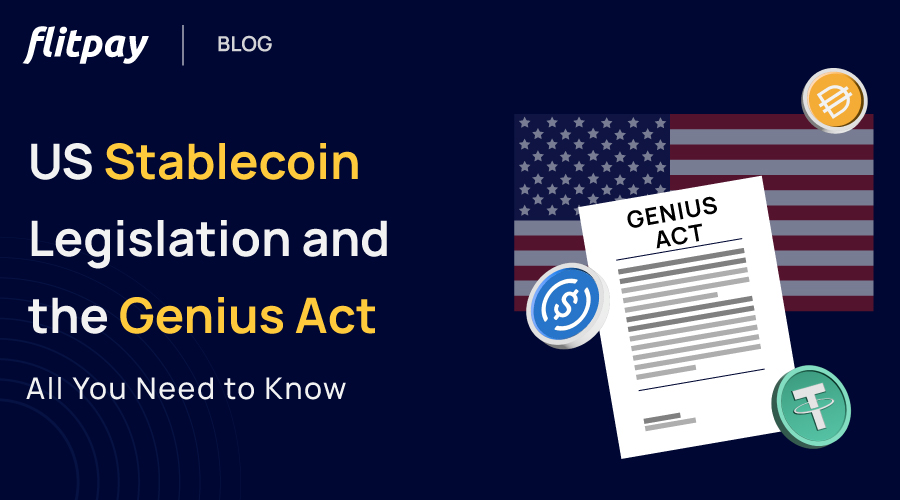Table of Contents
Understanding the GENIUS Act
- Who can issue a Stablecoin as per the GENIUS Act?
- What Are the Requirements for Permitted Payment Stablecoin Issuers?
The US Perspective: Why the GENIUS Act Now?
How will the GENIUS Act impact the Global Crypto Landscape?
FAQs
- What is the US GENIUS Act, and what are its main goals?
- How will the GENIUS Act impact stablecoin issuers and users globally?
- Will the GENIUS Act boost stablecoin adoption in India?
- What is India's current regulatory stance on Stablecoins?
In a landmark moment for the digital asset industry, the US Senate passed a bill to create a regulatory framework for stablecoins. The GENIUS Act, a milestone in legislation regulating the issuance and management of stablecoins, could usher in an era of unprecedented growth, synergy, credibility, and demand for US-pegged stablecoins in both the cryptocurrency and traditional payments sectors.
Stablecoins, cryptocurrencies pegged to the US dollar, are a rapidly expanding sector with a valuation of $250 billion today and an estimated $2 trillion by 2028. The cryptocurrency industry and the global financial sector are closely watching how developments unfold as the GENIUS Act is soon implemented into law, transforming the international digital asset economy and reshaping global finance.
Let us explore the scope and objectives of the GENIUS Act, its role in increasing the acceptance of cryptocurrencies as legitimate payment options, and how it will impact on the global crypto landscape, as well as India’s emerging cryptocurrency market.
Understanding the GENIUS Act
Fulfilling his pledge to make the U.S. the “crypto capital of the world,” President Donald Trump has taken several pro-crypto initiatives, including the launch of his token, TRUMP and the establishment of a Strategic Bitcoin Reserve.
The most recent and arguably the biggest development in this context is the GENIUS (Guiding and Establishing National Innovation for US Stablecoin) Act, which has gained bipartisan support with Democrats joining Republicans to back the proposed bill, 68-30. It was signed into law on July 18, 2025. The bill will next be discussed in the House of Representatives, which Republicans largely control, before it is sent to the White House for approval.
Who can issue a Stablecoin as per the GENIUS Act?
The GENIUS Act states that only a Permitted Payment Stablecoin Issuer (PPSI) can issue or sell a US-pegged stablecoin. Banks, credit unions, and non-banks chartered by the Office of the Comptroller of the Currency (OCC) can apply at the federal level. At the same time, smaller firms can choose certified state-level frameworks that meet federal standards. Foreign issuers are allowed only if their home country has similar regulations and they agree to the regulatory requirements and oversight by the OCC.
If enacted, the stablecoin bill would mandate that all PPSIs hold liquid assets such as U.S. dollars and short-term Treasury bills, amounting to the value of stablecoin issued by them. The stablecoin issuers will also need to publicly disclose the composition of their reserves every month.
The bill clearly defines a Permitted Payment Stablecoin Issuer (PPSI), which includes:
- A subsidiary of an insured depository institution that has received approval from the insured depository institution’s appropriate federal banking agency.
- A nonbank entity, an uninsured national bank, or a federal branch of a foreign bank that has received approval from the Office of the Comptroller of the Currency (OCC).
- A state-qualified payment stablecoin issuer that has been approved by a state payment stablecoin regulator .
What Are the Requirements for Permitted Payment Stablecoin Issuers?
The GENIUS Act lists out the requirements that are to be met by an entity qualified to issue payment stablecoins, which are:
- Licensing and Oversight Requirements: Companies that issue stablecoins will have to register with a federal authority. Those issuing stablecoins over $10 billion will have to comply with federal regulation and oversight, while those issuing less than $10 billion worth of stablecoins will have to comply with state regulations.
- Reserve Backing: Any issuer of stablecoins must hold 100% reserves in cash or US Treasury securities. All issued stablecoins must be backed with eligible securities in a 1:1 ratio.
- Periodic Audits: Issuers must comply with periodic audits and release regular public disclosures regarding their holdings and other mandatory disclosures.
- Consumer Protection: In case a stablecoin issuer goes bankrupt, stablecoin holders get priority over other creditors. This clause is unlike other bankruptcy and traditional insolvency protocols, creating an environment of security and stability for stablecoin users and holders.
While the bill has received majority support in the US Senate, it has also attracted some criticism, with the Conference of State Bank Advisors calling for “critical changes” to mitigate financial stability risks. Democrats in the US Senate also argued that the GENIUS Act wouldn’t necessarily prevent big tech companies from issuing their stablecoins. This could lead to a situation of financial instability, volatility and risks of corruption and money laundering. There is speculation that the bill could face changes in the House of Representatives with growing concerns around anti-money laundering protections and prohibitions for stablecoin issuers.
Trump’s Council of Advisors in Digital Assets touts that the stablecoin bill will be passed as early as August 2025, charting out a clear compliance calendar ahead of the 2026-2027 tax season for the digital assets market. One thing is certain: with the monumental GENIUS Act coming into play, digital assets will soon be a part of everyday payments and the transactional movement of money at the microeconomic level.
The US Perspective: Why the GENIUS Act Now?
The recent US Presidential election in early 2025 saw the crypto industry backing pro-crypto candidates with a $245 million spend, according to the Federal Election Commission Data. It is no secret that U.S. President Donald Trump has a strong focus on consolidating the cryptocurrency space. The introduction of the GENIUS Act can very well be the first among several more pro-crypto legislations and developments, which could be instrumental in bringing traditional finance and cryptocurrency together like never before.
At a time when China is increasingly working on bolstering the relevance of its currency, the Yuan, as a token of international payments, the GENIUS Act is America’s way of providing a silent push back and reiterating its relevance not just in global financial markets, but also in the digital assets space. More importantly, the Act positions the US Dollar as the key link between both these worlds, strengthening the dollar’s spot as the number one currency of the world.
Crypto analysts also believe that the GENIUS Act could pave the way for the stablecoin industry to thrive and innovate. Regulatory clarity could invite fintech firms, major retail firms, Wall Street biggies and even state-owned enterprises to delve into the stablecoin space, reshaping how payments and transactions take place in daily life. Retail consumers could also adopt stablecoins as a valid mode of payment if their interests are safeguarded with a strong regulatory framework that makes stablecoins as reliable as T-bills or US dollars.
With US President Donald Trump’s increased impetus on strengthening the crypto world, the GENIUS Act has come at the right time, with many more landmark regulations to follow.
How will the GENIUS Act impact the Global Crypto Landscape?
The implications of the GENIUS Act go far beyond the American continent. The Act will usher in a new era of credibility, bringing digital assets into the mainstream like never before. With the GENIUS Act soon becoming a full-fledged law in the United States, several major US banks and fintech companies will enter the digital asset space through ventures such as pilot programs, crypto trading departments, and partnerships with crypto asset management funds. A case in point is the recent pilot project between the state of Wyoming and Aptos to create the Wyoming Stable Token (WYST), slated to roll out in July 2025. This free and regulatory-backed access to modern digital technologies will help traditional enterprises leverage the benefits of the blockchain world, enabling Wall Street to forge deeper ties with the crypto world.
At the other end of the spectrum, several crypto entities such as Circle and Ripple are eyeing bank licenses, which would help them with faster payments settlement by bypassing intermediary banks and lend to their overall legitimacy and credibility. The GENIUS Act will further bridge the gap between traditional banks and financial enterprises and cryptocurrency entities, fostering an era of inclusive growth and an evolving global economy.
Further, analysts predict that the mandate for stablecoin issuers to hold liquid assets corresponding to their issuance will peak the demand for Treasury Bills, with stablecoin issuers becoming the third-largest buyers of T-Bills in the coming years. Hence, the GENIUS Act can be viewed as a tool to ensure that the US Dollar still holds a dominant position in shaping the future of the digital assets space, continuing to be a currency that links cryptocurrencies to the traditional finance network. Especially with China pushing the Yuan as a preferred global currency for exchange, the GENIUS Act reinstates the dominance of the US Dollar as the primary traditional currency in the digital assets world.
Other countries that continue to wish to hold strong trade and financial ties with the United States will also have to realign their regulations and crypto/stablecoin policies to complement the GENIUS Act. With America being a global superpower, several other countries, including India, will have to rejig the regulations and possibly even their tax regime surrounding cryptocurrencies.
Currently, India has a fairly high (30%) tax rate on crypto. The GENIUS Act may likely usher in a pro-crypto streak and a more conducive and clearer regulatory environment in India for cryptos in the foreseeable future. Indian fintech and payments firms could also open themselves up to the world of digital assets, offering crypto services domestically, akin to our UPI payments network. The success of UPI payments in India is indicative of the country’s readiness towards digital financial innovation.
For retail consumers and investors, the GENIUS Act will open up doors to cheaper and faster transaction settlements and payments. Stablecoins will cut remittance costs from 3-5% to under 1%, as well as the time involved in sending money across the world. Transactions that would take hours now take mere seconds. When we look at total remittances of any country, a 4% saving in remittance cost could amount to billions of dollars saved every year. This could also help lakhs of Indian families that regularly receive remittances from family members working abroad, resulting in higher incomes and swifter digital currency transfers at a fraction of the current cost.
Aside from remittances, this act will also push stablecoins as valid currencies for payment much deeper into traditional systems. Imagine Shopify rolling out USDC payments to cashbacks and rewards straight into a crypto wallet through stablecoins, near-instant payment settlements and seamless asset movements across digital channels and traditional finance networks, the GENIUS Act can open up a whole new world of integration and transactional ease, reshaping global finance.
FAQs
1. What is the US GENIUS Act, and what are its main goals?
The GENIUS Act, or the Guiding and Establishing National Innovation for U.S. Stablecoins Act, is a bill passed in the US Senate that is soon to become a workable law on how to regulate stablecoins pegged to US dollars or US Treasury securities. The GENIUS Act aims to create a federal framework for stablecoins, ensure compliance with disclosures and holdings, uphold consumer interests, and maintain the dominance of the US dollar as a key currency in linking the digital asset industry with traditional finance.
The GENIUS Act is the regulatory impetus that will attract fintech firms, traditional finance firms and even state-owned enterprises to the world of digital assets, ushering innovation and increased stablecoin adoption. The Act will also give retail investors confidence in using stablecoins as a valid mode of payment in daily life, thereby bridging the gap between traditional finance and digital assets.
2. How will the GENIUS Act impact stablecoin issuers and users globally?
The GENIUS Act charts out the requirements for any entity to become a Permitted Payment Stablecoin Issuer (PPSI). It also illustrates the regulatory mandates that stablecoin issuers must comply with. With such a clearly charted regulatory pathway, the GENIUS Act may help attract new banks, fintechs, and other big players in the traditional finance space to delve into the stablecoin niche through pilot projects and collaborations with crypto entities. For existing stablecoin issuers, the Act lends tremendous credibility and trust, as the issuers will now be compliant with several regulations in areas of safety, US Dollar/T-Bill holdings, consumer protection, disclosures and more.
For stablecoin users, the GENIUS Act will bring in faster and cheaper transactions, with stablecoins penetrating deeper into the traditional payments space. Soon, we can expect stablecoins to become a big player in areas of retail shopping, remittances & cross-border payments and more. The GENIUS Act will also increase the number of stablecoin users manifold, as individuals realise the benefits of the regulatory backing and safety measures brought about by the Act.
3. Will the GENIUS Act boost stablecoin adoption in India?
India is already a mature digital payments market with its thriving UPI payments network. With the GENIUS Act coming into play, India would have to realign its cryptocurrency regulations and steep tax regime to a more conducive set-up in order to continue maintaining strong trade ties with the United States. The GENIUS Act will certainly push India towards creating a pro-crypto regulatory and taxation outlook. This will be beneficial from the various viewpoints, including cheaper global remittances, faster transactions, easier digital payments and more.
We can certainly see stablecoin adoption increase in India in the coming months, not only to align with America’s pro-crypto stance, but also to leverage the many benefits offered by the GENIUS Act from a cost, safety and efficiency standpoint.
4. What is India's current regulatory stance on Stablecoins?
India currently has a cautious approach towards cryptocurrencies, classifying all cryptocurrencies, including stablecoins, as Virtual Digital Assets (VDAs) as per the India Tax Act of 1961. Cryptocurrencies are charged a high 30% income tax rate on crypto profits, while no deductions are offered for crypto losses. Cryptocurrency transactions are also charged with a 1% TDS, making the entire tax burden on crypto transactions fairly high.
From a regulatory standpoint, India’s Income Tax Bill 2025, which proposes a comprehensive regulatory and legal framework for Virtual Digital Assets (VDAs), will change the entire cryptocurrency ecosystem in India. Not only will this Bill simplify tax laws to a great extent, but it will also greatly align with the global standards for regulation and taxation of cryptocurrencies. The specific changes regarding VDAs are said to be implemented from April 1, 2025.





